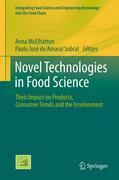
Novel technologies in food science: their impact on products, consumer trends and the environment
McElhatton, Anna
Amaral Sobral, Paulo José do
The book covers novel technologies, including high pressure, antimicrobials, and electromagnetism, and their impact. Covers novel technologies. Synopsis ofan ISEKI workshop. Excellent food and biotechnology resource. INDICE: Part I. Environmental Aspects. 1. Waste and its Rational Management. 2. Implementation of Hazard Analysis and Critical Control Points System in the Food Industry: Impact on Safety and the Environment. 3. Food By-Products for Biofuels. 4. Integrated Management Methods for the Treatment and/or Valorisation of Olive Mill Waste. Part II. Safety and Quality Considerations. 5. Safety Considerations of Nutraceuticals and Functional Foods. 6. Consumer Behavior: Determinants and Trends in Novel Food Choice. Part III. Novel Process Technologies with a Green/Environmental Slant. 7. Recent Advances in the Microencapsulation of Oils High in Polyunsaturated Fatty Acids. 8. Biocontrol of Foodborne Bacteria. 9. Plant Extracts as Natural Antifungals: Alternative Strategies to Mold Control in Foods. 10. Reduction of Mycotoxins Contamination by Segregation with Sieves, Prior to Maize Milling. 11. Rational Use of Novel Technologies: A Comparative Analysis of the Performance of Several New Food Preservation Technologies for Microbial Inactivation. 12. Emerging Technologies to Improve the Safety and Quality of Fruits and Vegetables. 13. Novel Technologies for the Preservation of Chilled Aquatic Food Products. 14. Use of Natural Preservatives in Seafood. 15. Edible Films: Use of Additives as Property Enhancers. 16. Clean Strategies for the Management of By-Products in Dairy Industries.
- ISBN: 978-1-4419-7879-0
- Editorial: Springer New York
- Encuadernacion: Cartoné
- Páginas: 476
- Fecha Publicación: 28/12/2011
- Nº Volúmenes: 1
- Idioma: Inglés
